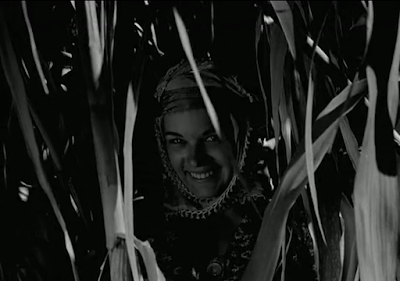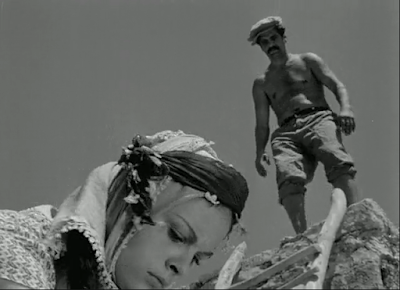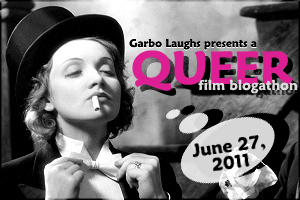
The longer I stare into the abyss of cinema, the more convinced I am that it is bottomless. It's intimidating, sometimes. No matter how much I think I know, I don't know anything. This week offers up two examples.
First, there's Frank Borzage's Lucky Star, a silent film from 1929 (for which sound footage was made, but which hasn't survived). This is a movie about which I knew absolutely nothing. I knew only that it starred Janet Gaynor and Charles Farrell, making the film a kind of third panel of a triptych. I "knew" that Farrell was the weaker half of the team. The previous two films, Seventh Heaven and Street Angel belonged to Gaynor, and it was obviously her talent that invested those two films with life. Well, that notion goes by the wayside. Lucky Star is Farrell's film.

On its surface, Lucky Star is a pretty simple film. It would be easy to mistake it for simplistic. It is certainly unashamed of the raw sentimentality that underlines (but does not overwhelm) the narrative. It's a melodrama, and in fine melodramatic fashion, it comes by its emotional effects. The story follows Mary, a farm girl hardened by poverty and an overbearing mother, and Tim, an electrical lineman who is swept off to The Great War and who comes back a cripple. Also in the mix is Tim's no good supervisor, who follows him to France as a sergeant, and whose shirking of duty is in part responsible for Tim's misfortune.
The character arc in Lucky Star is considerably different from the ones found in the other two Borzage/Gaynor/Farrell pictures. Gaynor is not an innocent waif buffeted by misfortune in this film, but is pretty hard-boiled. Farrell lacks the swagger that carried him through the other pictures. We also have a different archetypal landscape. This film is pointedly set in America rather than Europe, and that entails a certain corn-pone atmosphere, though one that's overlayered with the director's poetics. Borzage also brings a preference for unsubtle metaphors to the film, too. When Farrell scrubs Gaynor clean of the filth in which he finds her, He's scrubbing away corruption, too. And the ending of the film is pure fantasy, but an appealing one. It's not an unearned fantasy. I wouldn't have thought that I would find a film that I prefer to Seventh Heaven at this late date, but here is a film that is irresistable. As pure light and shadow, it's a film of great beauty.
Also a huge surprise is Dry Summer (1964, directed by Metin Erksan), which I discovered over on The Auteurs. This is a film I had never heard of--not surprising since I know zilch about Turkish cinema. I should have heard about it, though, because, like Lucky Star, it's a masterpiece. It reminds me of the moment when Italian Neo-realism cracked wide open into operatic melodramas. It's in that vein. It's worthy of Visconti. It certainly has the political subtexts.

The story here concerns two brothers who own the land where a spring provides water to the neighboring village. One brother wants to dam it and keep the water for their crops. The other is more magnanimous. The younger brother is courting the beautiful Bahar, who the older brother also covets. This is a combustible mix, which explodes in murder, mob violence, and fratricide.
This is a film of often startling cinematic invention. For example: in one scene, Bahar has been told that her husband has been killed in prison and the camera looks to have mounted in a barrel and rolled along to give a version of her perception. In another, the younger brother, Hasan, chases Bahar into some brush, and the camera becomes unhitched and moves of its own accord in a kind of delirium.

The film is dominated by actor Erol Tas, whose central figure is as depraved a character as they come. His rise and fall has something of Shakespeare about it, and the film is ultimately a tragedy. His brother is played Ulvi Dogan, who has leading man good looks, while Bahar is played by Hülya Koçyigit. The film is considerably more sexually charged than I would have thought for a film coming from a Muslim country (though Turkey has always prided itself on its secularism). Two scenes in particular: Hasan and Bahar's wedding night, in which we see Hasan kissing up her legs; and a scene where Osman sucks a snakebite. It's a film of unrestrained passions.

As a final note, this film has real violence towards animals in it. I'm not inclined to fault the filmmakers--I have no idea what their cultural viewpoint is on this point--but it does make the film difficult to watch at times.
I wonder what other cinematic treasures lie undiscovered in the film vaults of the world.
You can see this film online for free until the end of August, when presumably it will revert to modest fee. Hopefully, Criterion or some other DVD label will pick it up. It's worth checking out.















No comments:
Post a Comment